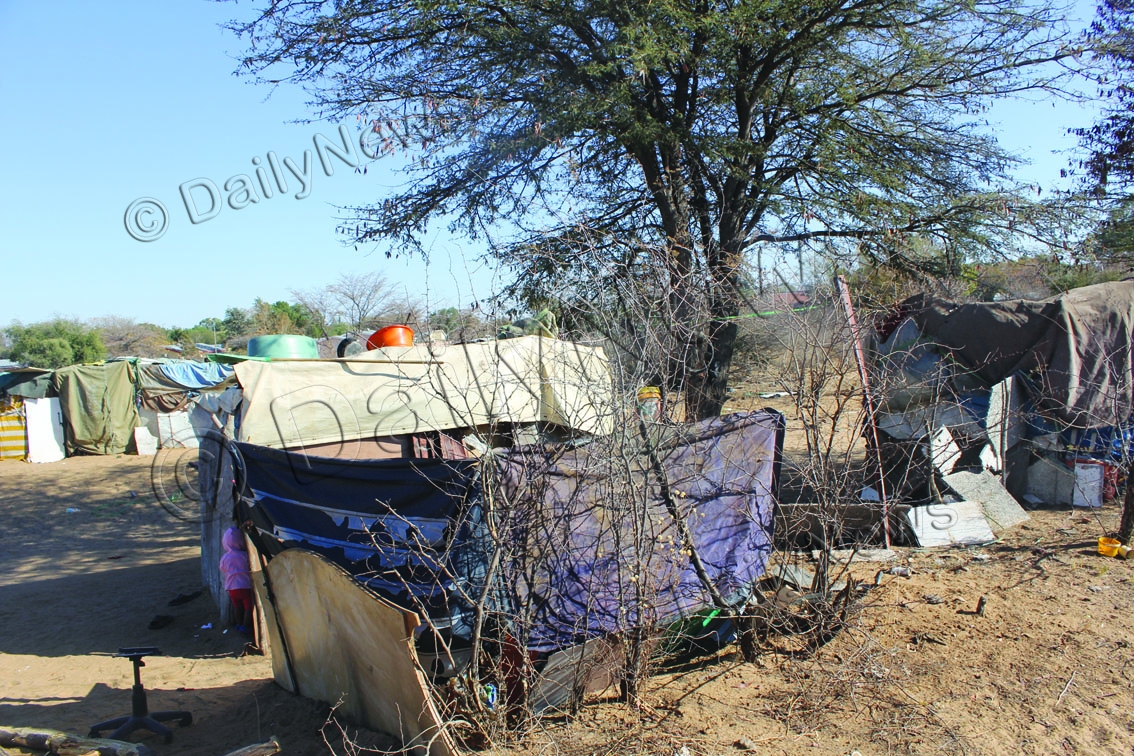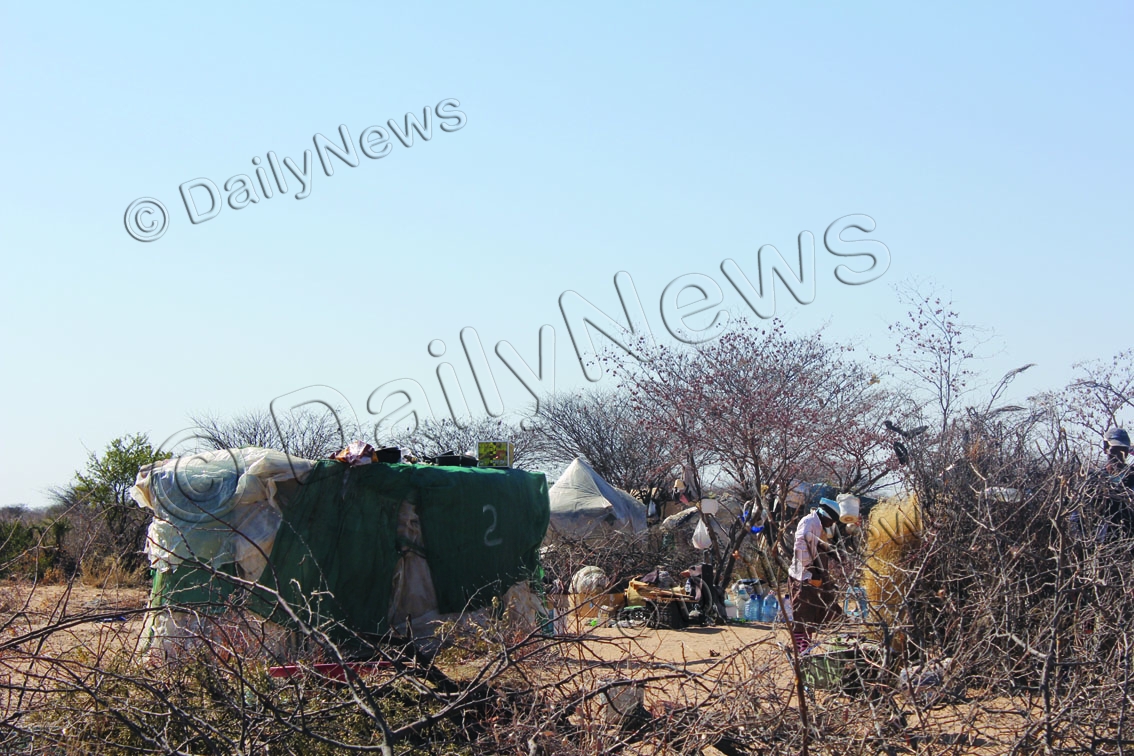Squatters haunt Jwaneng
08 Sep 2015
The only woman among a company of three men finds solace in a hot cup of tea, occasionally whisking away the smoke that seems to be targeting her teary eyes. Her male companions are casually chatting about this and that and the youthful one on her right is enjoying a bowl of stiff porridge and milk.
From a small distance a toddler is seen playing with sand, oblivious of what is happening in his surroundings.
This would seem like a normal set up of a low class homestead in any given area in Botswana, except that this particular scene is an illegal residential site commonly known as squatter camp. Popularly known as Nagamphabatho, the camp is situated outside the Jwaneng township’s southern gate, and, like other squatter camps, it is characterised by old structures made of cheap material such as secondhand plastics and wood.
This place, however, does not hold the record as the biggest squatter camp to exist in Jwaneng because in 2012, law enforcers had to dismantle the then renowned Senthumole squatter camp which had grown awesomely big over the years.
By the time the squatters were evicted, the place was essentially a small shanty town within a town, boasting of informal facilities such as food kiosks, vehicle repair workshops, drinking spots, and hair salons, among others. Even though Nagamphabatho squatters always seem to be at ease and living comfortably in their structures, this kind of arrangement does not erase the fact that squatting is illegal in Botswana.
The circumstances surrounding their lives have proved too much to bear; hence they have decided to make the best of times before they are evicted, they argue.
“I moved here two years ago for employment chances in Jwaneng and life is better now because I do menial jobs for other people,” says one of the group around the fire in an interview. Mr Phetogo Bantatetse of Mokhomma adds that his small earnings do not allow him to commute from his home village; hence he has resorted to squatting.
“What else could I do? Rent is high in Jwaneng,” he asks rhetorically as he moves closer to the fire, adding that moving closer to the mining town was the best decision he had ever made since he can now afford to buy himself food and regularly provide for his mother.
The 58-year-old believes that even though he is not employed formally, he is grateful that he has managed to secure piece jobs that pay him monthly, and some of his employers are kind enough to give him old clothes that they no longer need.
His only challenge is the fact that there are no essential facilities such as running water and modern toilets, he says with a look that makes one wonder if he mentioned the statement by mistake because thereafter he is not keen to reveal how they deal with such a situation.
His younger counterpart puts down his empty bowl as he prepares to take over, but not before he has downed a set of tablets.
“I used to work for a company that was contracted by the Jwaneng Mine and during that time I was renting a house at Sese,” he reminisces, adding that he could not continue with the work after he had a back injury that landed him at Nagamphabatho squatter camp some three months back.
The 31-year-old Alex Masole of Moshupa, says even though he foresees himself having proper accommodation in future; he does not mince his words when he blames authority for squatting saying land allocation should be expedited so that more Batswana could own their own plots.
The fact that his mother applied for a residential plot in Jwaneng way back in 1993 does not sit well with him now that she has also resorted to squatting.
“My mother has been waiting for a plot ever since and now that she works for Ipelegeng in Jwaneng, circumstances have forced her to come here as well, says the young man.
At least in Jwaneng the Ipelegeng contract is longer compared to villages like Moshupa where they have to keep alternating,” he says with a sad face. Masole dreams of a future where he will be able to provide for his two children who are currently staying with their mother at the nearby Lefoko village, as well as having a decent roof over his head.
However, he says, this will be all in vain unless the status quo of plot allocation is changed.
The saying that “first impressions last longer” would put Jwaneng in bad light if put into practice. For most people the town is known as the one that produces the highest valued diamonds across the world.
What immediately comes to most people’s minds, especially tourists, would be an all glittery town conveniently situated along the famous Trans Kalahari Highway that connects Botswana to neighbouring countries of South Africa and Namibia. The town is always busy with activity especially from the big trucks that are always transporting goods between these countries.
Nonetheless, what comes to sight immediately after the nicely designed ‘Welcome to Jwaneng’ sign board is a total opposite of an average person’s expectation.
Coming from the eastern side, a glimpse on the right reveals an eyesore of plastic and cardboard structures which are home to families that originate from different parts of the country.
Unlike their counterparts at the far end of the town, these squatters have chosen to position themselves just a stone’s throw away from the main road. For elderly Setshoga Ramotsepu, squatting has been her way of life as long as she can remember and she is not bothered by the legality of this arrangement.
As far as she is concerned, she has been able to provide for her school going children back home in Pitseng through the part-time jobs that she initially did for Jwaneng residents until she was employed through the Ipelegeng programme. At least here she does not have to compete for employment with others because she works continuously for the whole year, she says.
Even though her youngest child is benefitting from the social grant back home, she prides herself in the fact that she also provides for her on regular basis.
Jwaneng mayor, Mr Tsietsi Oodira-Kwenje says the council has partnered with other local authorities to address squatting.
“We have conducted a research on these squatters and we are awaiting a meeting with officials from the Ministry of Local Government and Rural Development and that of Lands and Housing in order to present the findings and recommendations,” he says.
The town mayor believes that the only solution would be to encourage the squatters to return to their respective villages, and this time around the council intends to officially hand them over to their respective councils.
The same strategy has not born any fruit in the past because other local authorities were not engaged in the matter, and he is optimistic of positive results this time. Apart from the fact that their structures are an eye sore, the mayor is concerned about the overall health of the squatters, especially the children who are also missing out on a lot of government programmes.
He says recently a baby fell ill and died from an unknown illness, “so as council we are really concerned.”
However, what worries the mayor most is the fact that most of the squatters have not applied for residential plots anywhere in Botswana, so they will be taken back to their families and relatives. Nonetheless he believes most of them would qualify for government programmes because of their economic standing.
Cllr Oodira-Kwenje acknowledges that some of the squatters are employed under the Ipelegeng programme, which he attributes to the Jwaneng residents’ failure to meet the set quota for Ipelegeng.
“Our quota is 277 per month which translates to a cumulative figure of 3 324 in a year. We give priority to Jwaneng residents but we increase the number when we fail to meet this quota. Unfortunately this is a tricky situation because we cannot establish if some of these people seeking employment are squatters or not,” he explains.
Moreover, the mayor believes that solving the issue of squatters is not a far-fetched for as long as the relevant parties are committed.
“This is a very sensitive issue and it reflects badly on the Jwaneng Town Council and Botswana in general. We are talking about people’s lives here and all the stakeholders should be seen to be committed,” he laments. Ends
Source : BOPA
Author : Kehumile Moekejo
Location : Jwaneng
Event : Interview
Date : 08 Sep 2015







